Backlink exchange is when two or more websites deliberately agree to link to each other.
Just saying that out loud can spark fierce debate — and actually doing it?
Critics love to slam it, but there are plenty of success stories, too.
After years in SEO, I’m firmly in the camp that’s seen it work.
To help you see link swapping as an asset that can genuinely level up your link-building strategy too, in this post, I’ll cover:
👉 What is link exchange
👉 Different types of backlinks exchange
👉 How to exchange backlinks
👉 Where to find link swapping opportunities
👉 What to steer clear of when doing link exchanges
What Is Link Exchange?
Backlink exchange is a link-building tactic that doesn’t involve buying links.
Instead, it’s a voluntary agreement between websites to link to each other when they’re relevant to the same niche or industry.
To make it more illustrative, think of three websites as A, B, and C.
Site A links to Site C, Site B links to Site A, and at the same time, Site C gets a link from Site B.
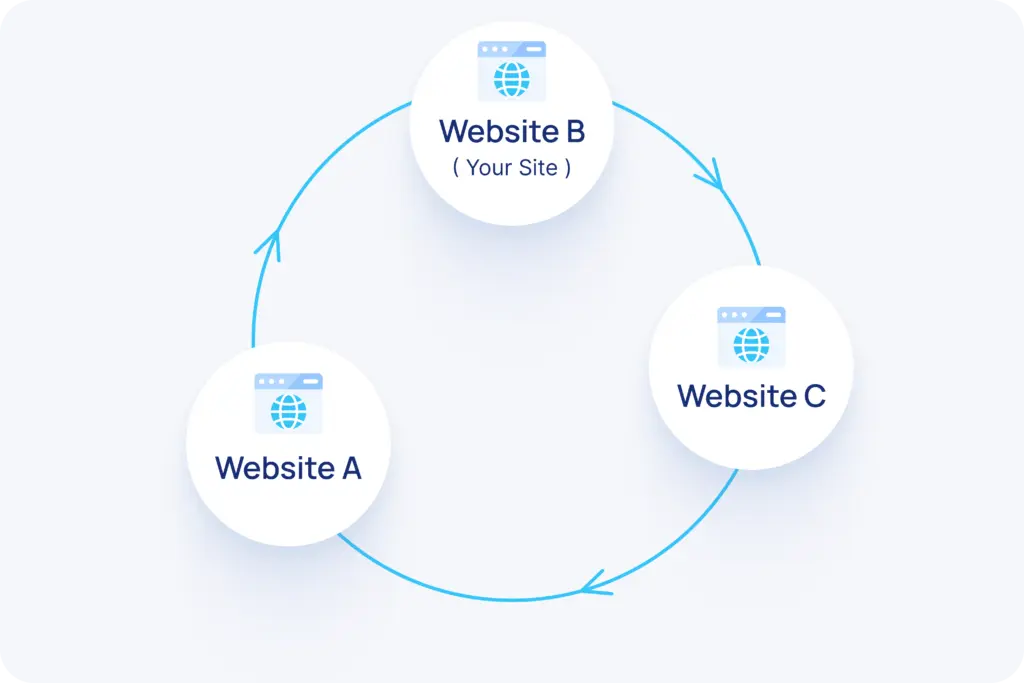
This way, all three sites are connected through a chain of backlinks, passing link juice, enriching each other’s backlink profiles, and strengthening their visibility to search engines.
📌 Bottom line: The core idea behind this swapping scenario is to create a win-win SEO outcome for all participating websites — which is why it’s often called an ABC link exchange.
Looks good on paper — but if you ask me, how popular is this tactic in practice?
Well, according to our latest 2026 State of Link-Building Survey, which included 518 SEO experts, agency owners, and specialists, 9.3% consider link exchange to be an effective link-building tactic.
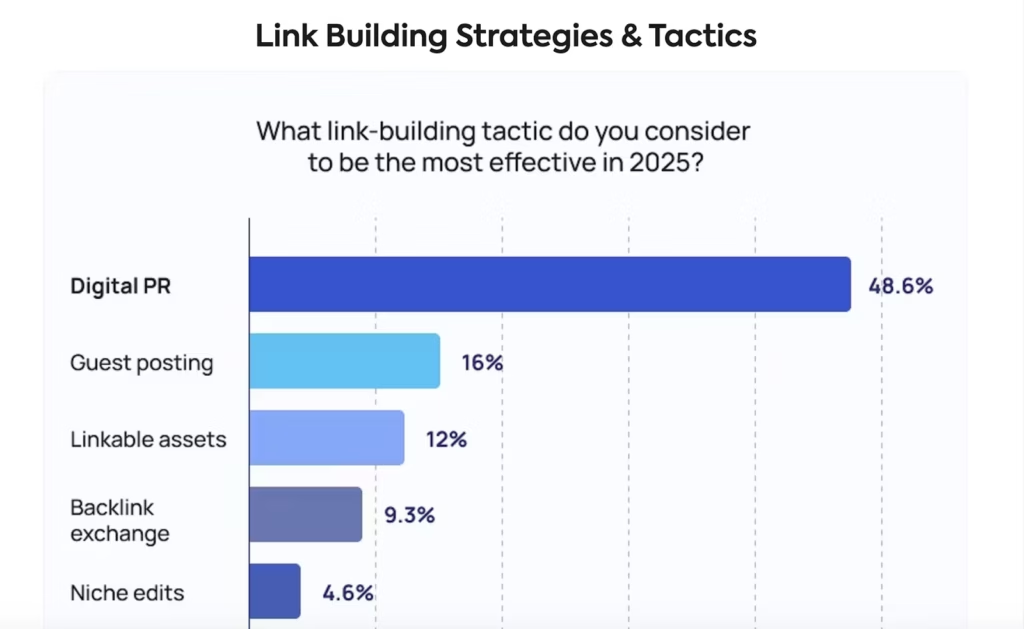
It made it into the top five, alongside digital PR (48.6%), guest posting (16%), linkable assets (12%), and niche edits (4.6%).
📌 Bottom line: While backlink exchange isn’t exactly a mainstream tactic, the fact that it’s listed alongside more tried-and-true strategies SEOs rely on in 2026 suggests it still has its place — when used strategically.
Types of Link Exchange
Thinking of SEO link exchange, many imagine it as something pretty basic — just trading mentions between sites, like “you link to me, and I link to you.”
Wrong.
In reality, there are far more types of link exchange in SEO than most might guess — ranging from the simplest one-to-one swaps to much more elaborate ones.
Here are the most commonly used types you might run into:
- 2-way link exchange
- 3-way link exchange
- 4-way link exchange
Surprised?
There are even more creative link swap setups out there!
Say, you need 5-6 backlinks fast, all from different sites in a niche you’re targeting.
What’s the best way to do it?
Reach out to those 5-6 target sites with a guest post pitch — something like a listicle or an informative article that features all of them.
Then, ask if they’d be willing to link back to your site in exchange.
📌 Bottom line: At first glance, it might seem like you’re generously giving away links. But in reality, YOU are the one acquiring 5–6 new links — in the niche you want, from the sites you want, on the terms you want, all at once.
Call it a 6-way link exchange, a backlink bonanza, or just clever SEO — even sweeter when every site in your swap drops in just one link… and you get a six-pack of backlinks. 😁
Now, let me walk you through these backlink exchange types one by one to help you get familiar with each.
2-way link exchange
This is the simplest form of link trading between two sites, commonly called a reciprocal link exchange.
Understand it just like it sounds: reciprocally.
Site A links to Site B, and Site B links right back to Site A.
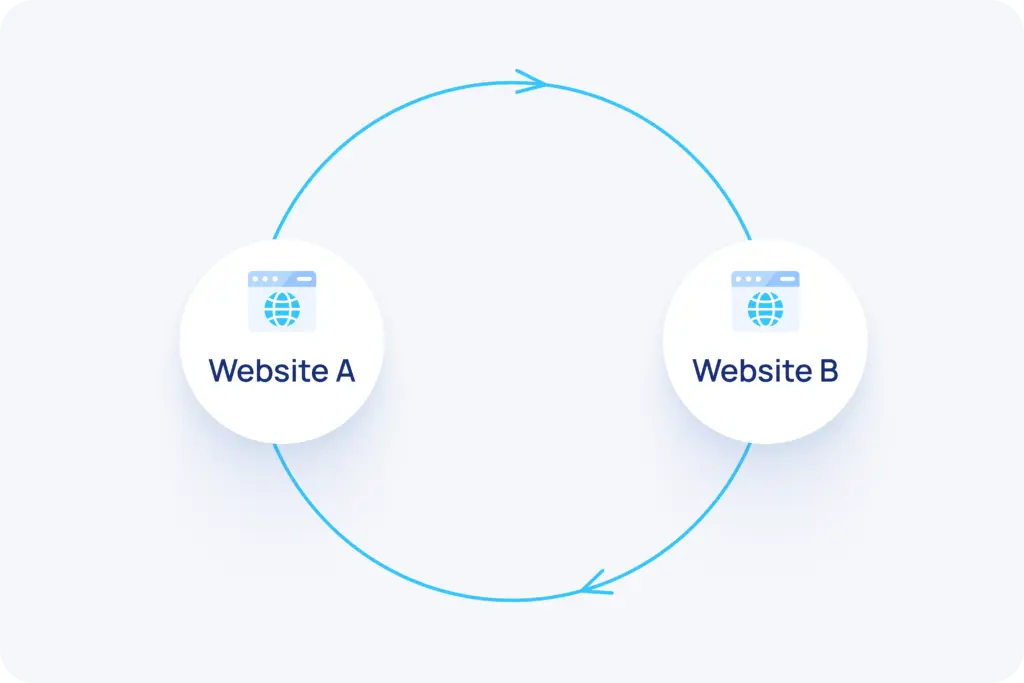
💡 Pro-tip! It might look like a quick SEO hack, but direct link swapping is anything but safe. Google can spot this kind of back-and-forth link pattern pretty easily, so those links often get devalued — and both sites can end up penalized.
3-way link exchange (ABC)
This type of link exchange is slightly more complex and was originally designed to avoid the potential risks of direct link exchanges.
Here’s how it works: Site A links to Site B, Site B links to Site C, and Site C completes the loop by linking back to Site A.
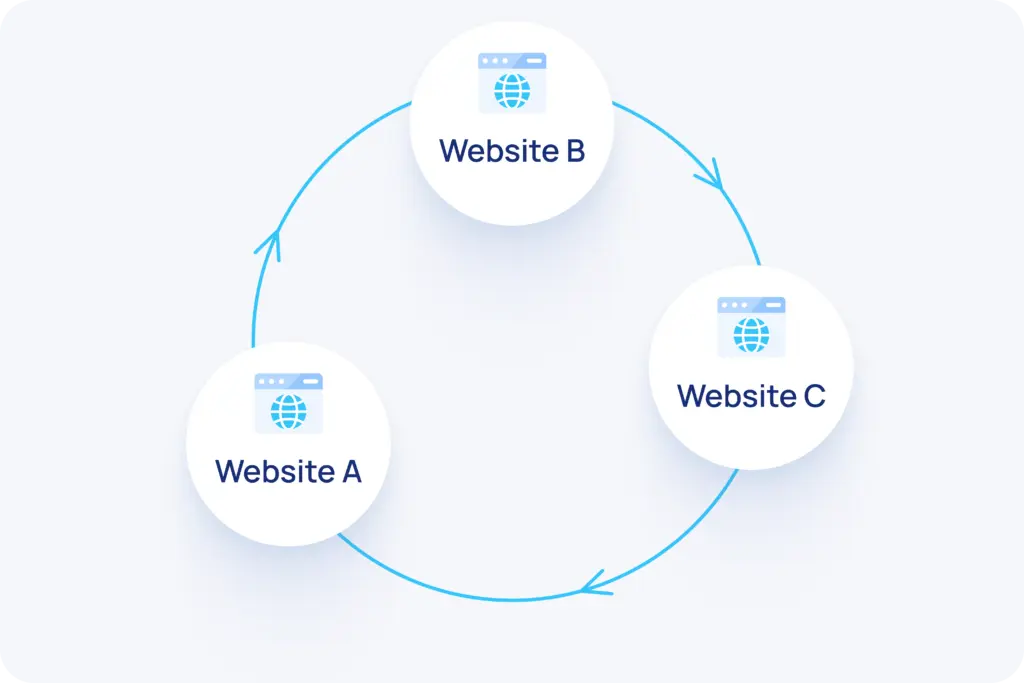
An indirect exchange still delivers PageRank and SEO perks, but it’s less likely to get flagged by Google.
Rather than linking straight to each other, two sites use a third site to pass the link, mimicking a direct exchange without leaving an obvious trail.
💡Pro-tip! A three-way link exchange only pays off if at least two of the sites have real authority — otherwise, it’s not worth the hassle. Since it’s basically a chain of one-way links, each site’s goal is to land a strong backlink from a credible partner.
4-way link exchange
As you may expect, when complexity increases, a four-way link exchange involves up to four different domains.
To benefit from this, you must own at least two sites (A and B), while your link swap partner controls the other two (C and D).
This is how it plays out: you link from your Site A to their Site C, and in return, you get a link from their Site D back to your Site B.
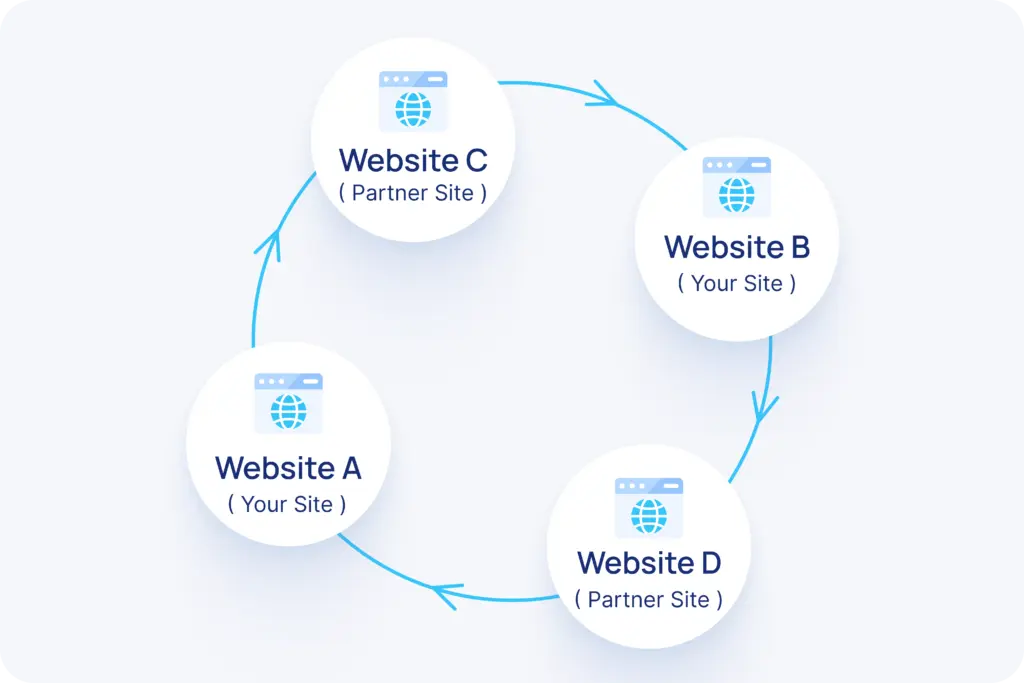
💡Pro-tip! For large companies with dozens of sites — and partners who do too — there’s virtually no limit to how deep link exchanges can go. That’s why this strategy is called a “Private Influencer Network.” It’s considered one of the safest ways to exchange links, since it leaves minimal footprints for Google to detect.
Is Backlink Exchange an Acceptable Strategy?
In my experience, yes — it’s a perfectly valid and effective strategy that can help you score plenty of unique backlinks.
There’s one catch, though — you have to use it carefully.
Just look at Google’s Link Spam Policy: they clearly say that excessive link exchanges count as a link scheme and can get you penalized for trying to manipulate rankings.
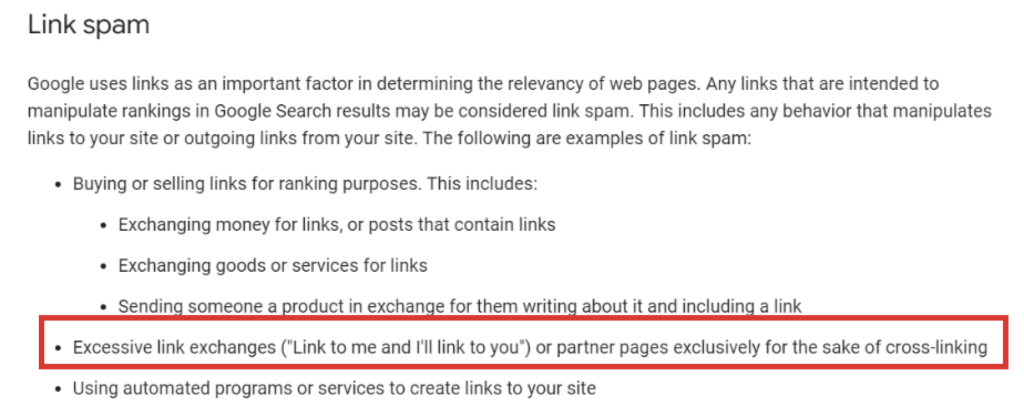
Your real focus should be on the word “excessively.”
The problem isn’t link exchanges themselves — it’s overdoing them.
If you’re too aggressive, trading in bulk, and ignoring relevance, sooner or later, you’ll end up swapping for something low-quality that could trigger penalties.
But if you’re selective and pay close attention to the quality of the sites you link to, it’s unlikely you’ll get penalized — even for reciprocal links😱
By the way, Ahrefs backed this up in a 2020 study showing that 73.6% of the websites they analyzed had reciprocal links.
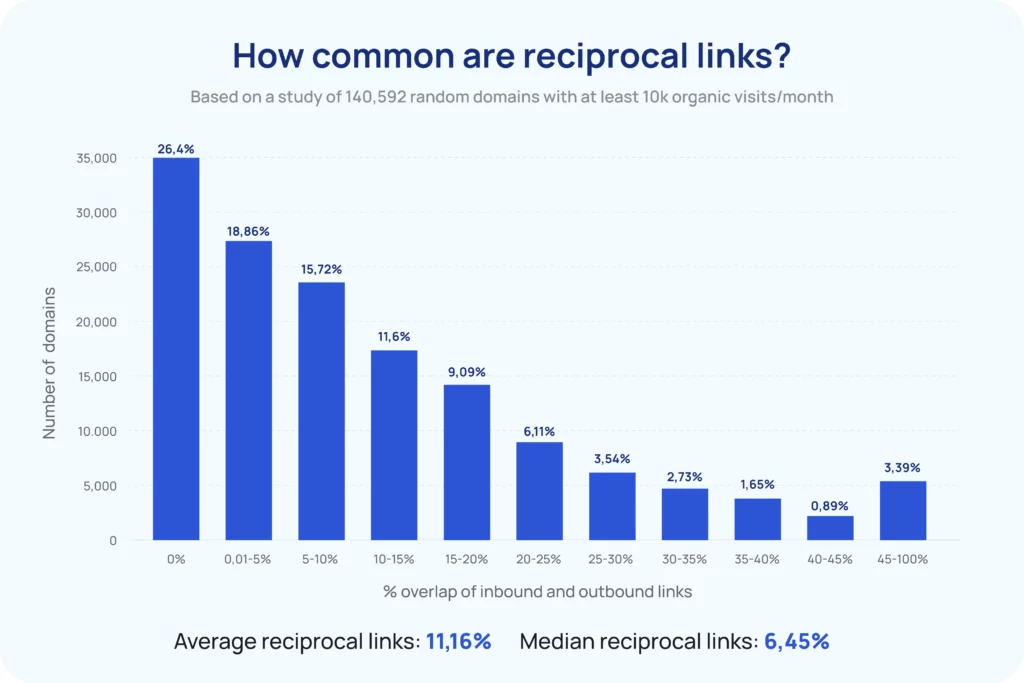
Have those sites been penalized or anything?
I seriously doubt it.
It’s not the freshest study either, I’ll admit — but if someone ran similar research in 2026, I’m pretty sure that percentage would be even higher by now.
📌 Bottom line: Sure, link swapping might technically count as manipulation. But if your link actually adds useful info, research, or helpful context that fits your niche, it’s not harmful. You’re just following the user-first rule — giving people real value with your links.
How to Do Link Exchanges?
Alright, moving from theory to practice — here are some practical hacks for anyone who wants to try link exchanges while keeping things safe.
Option #1: Link Insertion Exchanges
One option to consider is link insertion swapping. It’s valuable because you get your links placed within someone else’s existing, high-performing content — so you benefit from their traffic.
At the same time, inserting your links into new content on well-performing sites lets you be among the first to capture their audience’s attention.
👉First things first: really dig into the sites where you want to place your links. Make sure they are authoritative, fit your niche, and make sense for your audience.
💡Pro-tip! You can do the research yourself, or use specialized link acquisition services if you want to speed things up.
👉 As step two, find the right spot within the donor’s content to place your link — it could be a line, paragraph, or even just a phrase. Also, be thoughtful about the anchor text you use.
👉 Talk to the site owner, editor, or creator and share why your link would be valuable to their audience. Offer a fair link swap, and let them decide on comparable conditions for their link on your site.
👉 Once your link is in place, periodically review it to confirm it remains live and effective.
💡Pro-tip! Reciprocal link inserts can work well here, but for extra safety, consider an ABC-type swap — using an intermediary site to pass your link. This approach is less visible to search engines and better for long-term results.
Option #2: Guest Post Link Swapping
Personally, I’m not the biggest fan of this tactic, but there’s no denying it works.
Basically, Site A writes a guest post for Site B and sneaks in a backlink.
Then, Site B returns the favor, writing a guest post for Site A with its own backlink.
Simple, natural, and everyone walks away happy.
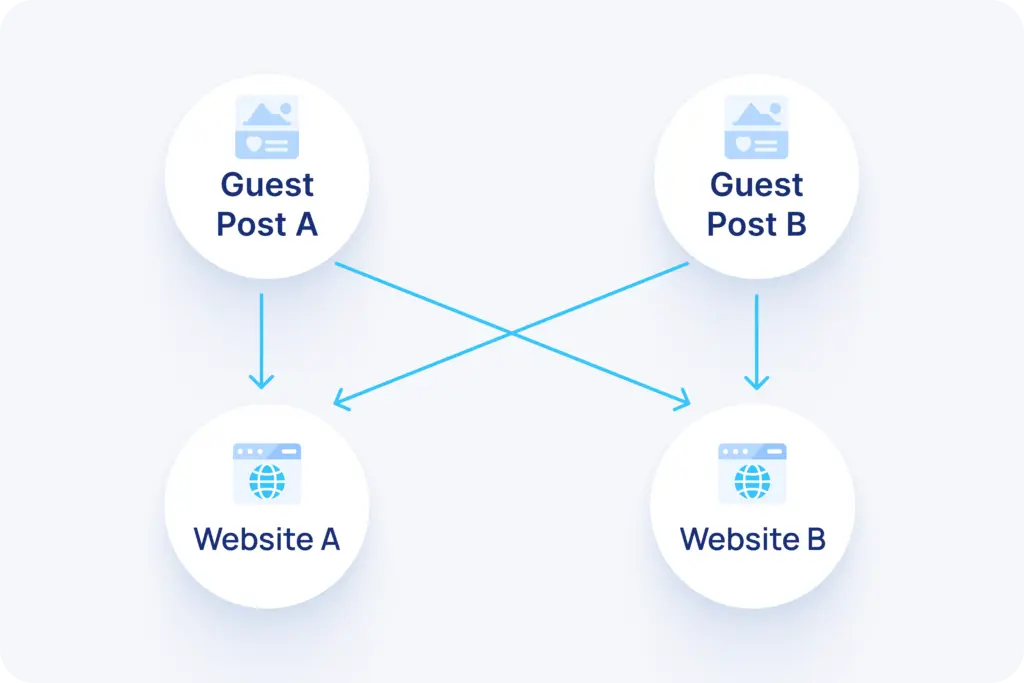
💡Pro-tip! If you can’t find anyone up for a direct guest post swap, you can still offer to write a guest post as a goodwill move — or to get on someone’s radar for future swaps.
Where Can You Find Link Exchange Opportunities?
Link exchanges aren’t exactly rare — they’re offered everywhere.
But sorting through a pile of junk offers to find the ones that truly fit your niche?
That’s the real challenge.
Here’s where you can try your luck, as long as you’re ready to dig deep.
Facebook groups
Honestly, Facebook isn’t a bad option at all. It’s full of active groups, and wherever you have millions of users, SEOs and link-builders are sure to follow.
New backlinks exchange groups show up every day, so it’s worth diving in and seeing what you find.
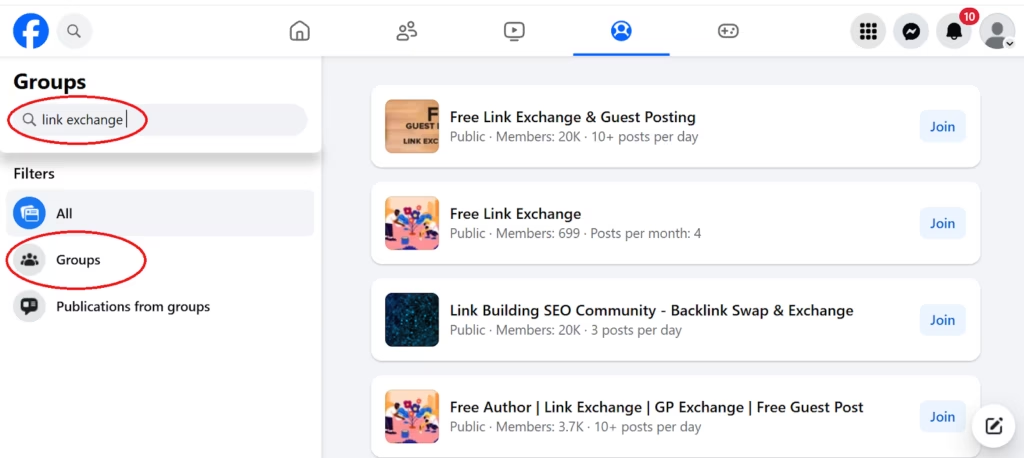
Slack groups
Slack is well known as a shared online space where people with similar interests — like SEO, marketing, link building, or tech — can connect, chat, and collaborate.
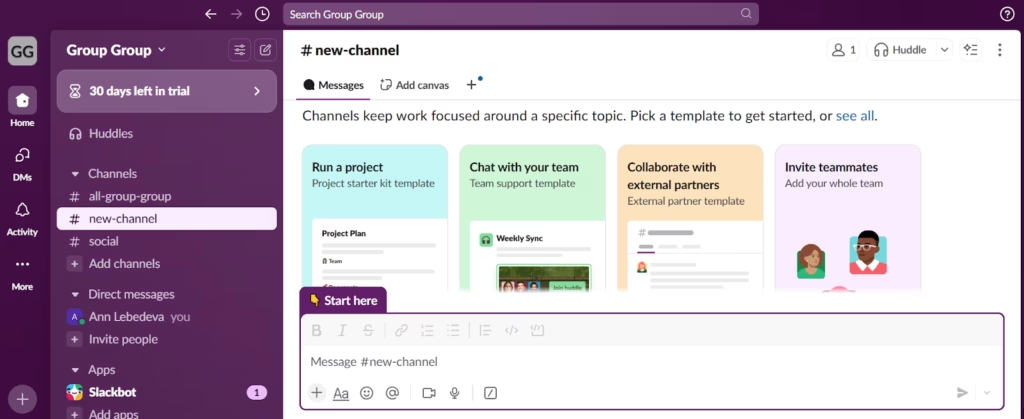
Unlike Facebook, Slack doesn’t have public groups you can browse or search.
Most Slack workspaces are private or invite-only.
If you’re not part of any community yet and don’t have someone to invite you, don’t get discouraged — Slack can still work for you.
You can tap into its semi-public workspaces, which you can find through:
👉 Google — just type in key phrases like “link building Slack group,” “SEO Slack community,” or anything similar.
👉 Slack community aggregators like:
- Slofile — browse by topic (marketing, SEO, startups)
- Find A Slack — marketing, business, tech
💡Pro-tip! Such aggregators work through keyword searches, so to find the right Slack group, type keywords like “SEO,” “marketing,” “link-building,” and similar terms into their search bars.
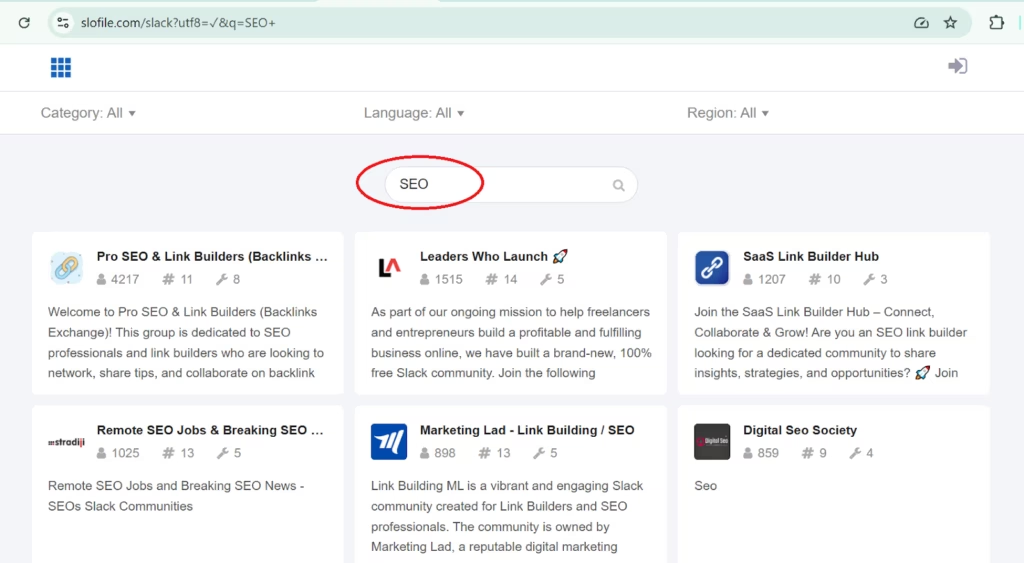
👉 Signup forms
Some Slack link exchange groups require you to complete a sign-up form — and occasionally pay a small entry fee to join.

Reddit might be old news for those actively searching for industry insights, but it’s still a hotspot for link exchange offers.
Just focus on niche-oriented subreddits where link-building conversations happen.
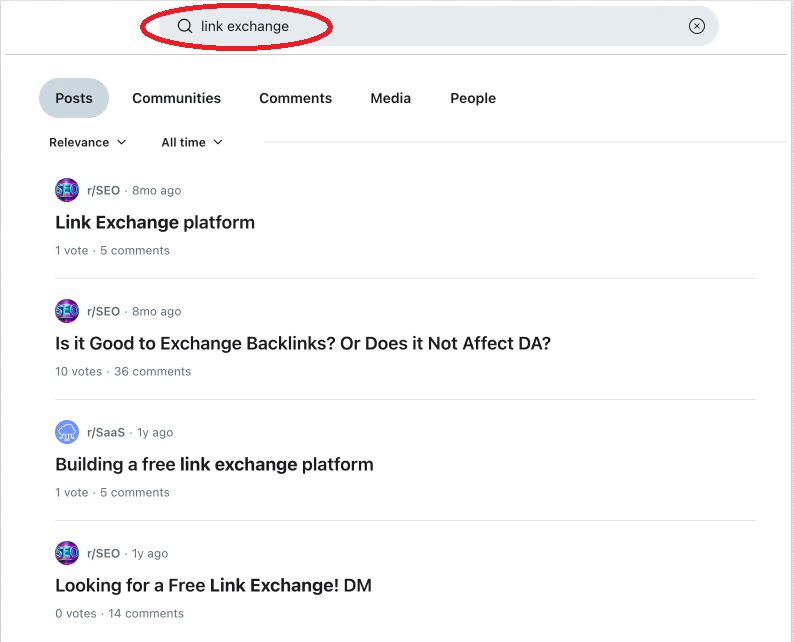
💡Pro-tip! Of course, you shouldn’t offer link exchanges in the comments — it’s better to reach out via private messages. But if you’re an established, long-time member of SEO and link-building subreddits, you probably already know who’s open to it.
LinkedIn has long been more than just a place to connect professionally — it’s where people come to pitch and sell, both directly and indirectly.
Seriously, who isn’t trying to slide into your DMs with their products or services these days?
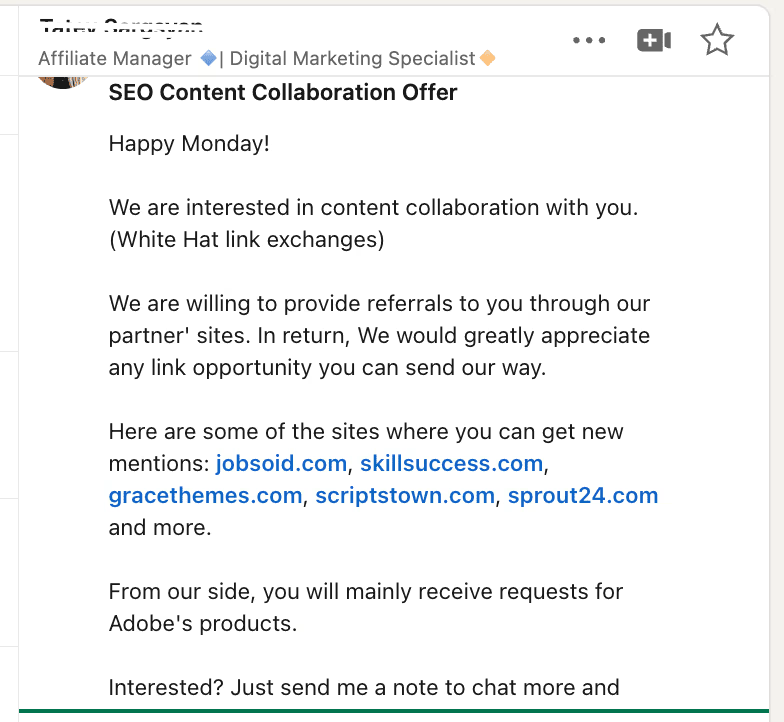
SEOs get bombarded daily with link offers — sure, a lot of it’s junk.
But every now and then, hidden among the trashy InMails, there might be some real gems.
Always worth checking!
Outreach
Old but gold!
No matter how many messengers, professional networks, or communities we join, good old-fashioned outreach will never fail.
This again requires thorough research to find websites that match your niche, along with content that’s a perfect fit for your link.
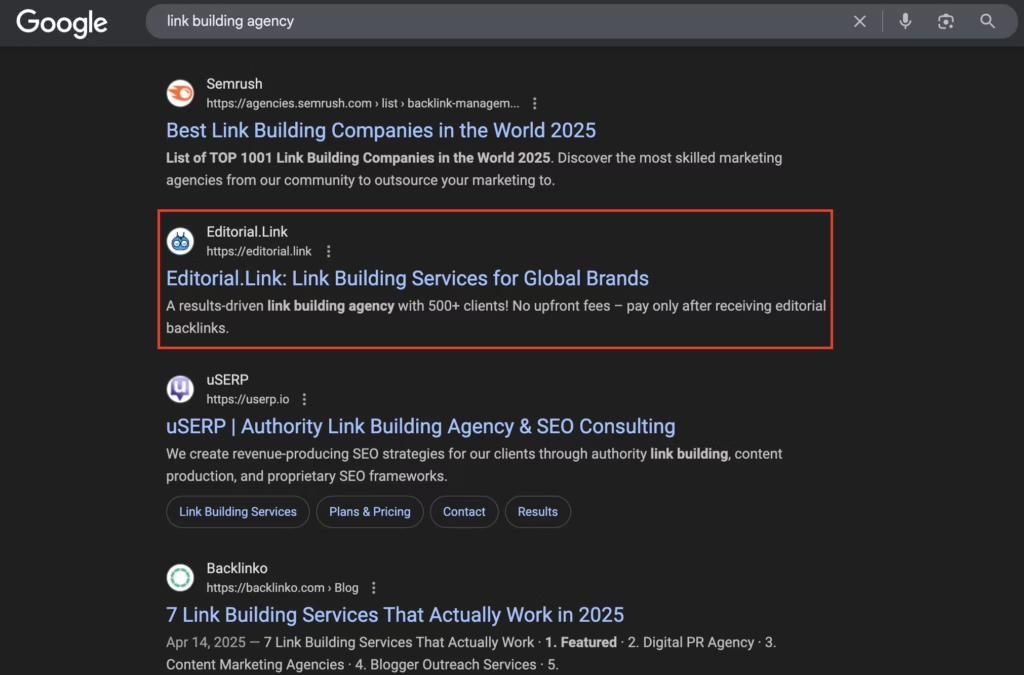
Next, identify the author, content creator, or someone connected to the site who has the authority to consider your link-swapping proposal.
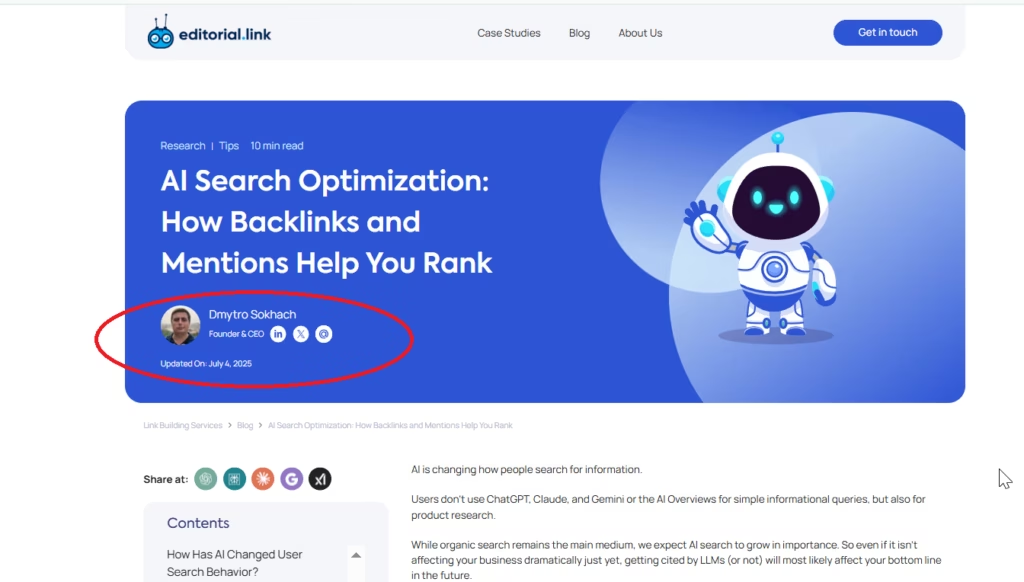
Connect with them — say, on LinkedIn — and politely propose backlink exchange.
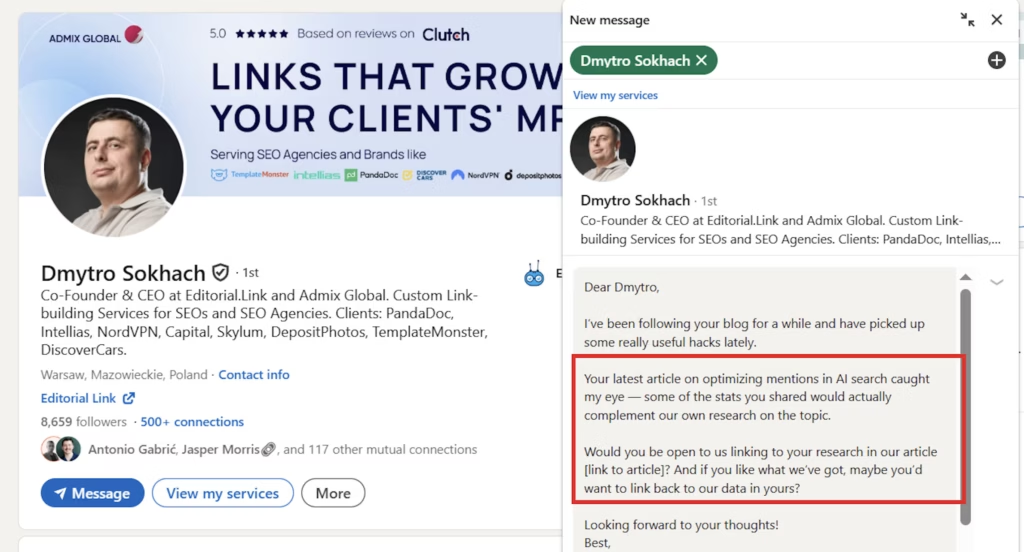
The trick is to bring real value to the table — don’t just ask for a swap without a good reason.
You’d be surprised how many top sites are down for an exchange if it actually benefits them!
Why Link Exchanges Can Backfire
As simple as it sounds in theory, finding good, high-quality sites open to exchanges is doable — but offering real value in return can be the hardest part.
You might get turned down, for example, because of low DR/DA (yes, some people really do look at that), even if your site is actually growing, building a brand, and ranking in AI/AI Overviews.
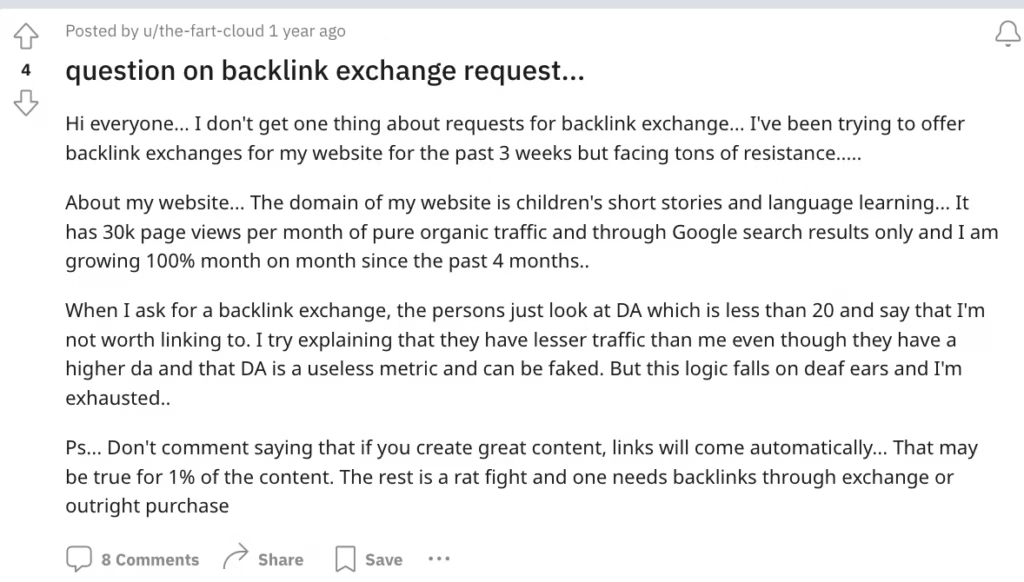
💡Pro-tip! High DA/DR sites tend to trade links with sites that match their metrics — which means if your numbers are lower, landing those swaps can be a real challenge.
Timing’s another snag. Some sites will only add your link once they spot theirs on your site first, and that whole back-and-forth can stretch out the process way longer than you’d like.
Not to mention how tough it is to manage a high volume of link swaps.
If you’re solo, it gets even harder — quality exchanges usually mean you need to juggle thousands of contacts to keep things moving.
Final Words
Link swaps aren’t the monster Google makes them out to be — just don’t go overboard, and they’re a 2026 essential for any smart link‑building playbook.
Still on the fence?
Hand it off to Editorial.Link. We specialize in heavy‑hitting swaps that dig deep and deliver big.
Give us a shout, and let’s get you linked!

